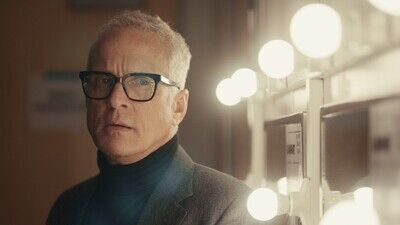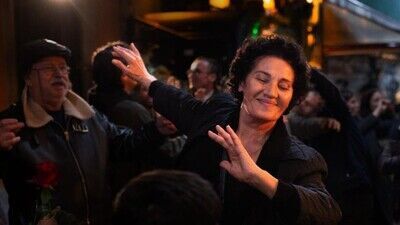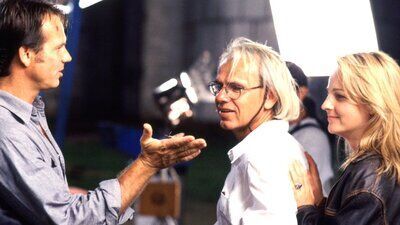The main job of Will and his colleague/best friend Kyo (Benedict Wong), who lives in a house not so far from the one belonging to Will, is monitoring the everyday lives of souls who were born into our world after being evaluated and then selected by them. Via a bunch of old-fashioned televisions assembled in the living room of his house, Will often watches how those people selected by him live their respective lives day by day, and he has been particularly interested in a young woman who grew up to be a talented violinist. And then something quite tragic happens in her life. This turns Will’s seemingly uneventful daily existence upside down as he becomes increasingly obsessed with how that could happen. He begins to check one record after another, searching for answers, and Kyo is naturally concerned about him, though he cannot possibly give Will any pep talk, as an entity who has never lived a life in contrast to Will.
Soon, there comes a very important time for Will. He is going to handle a number of different candidates to be evaluated by him during nine days, and he must eliminate all but one of these candidates, according to how they respond to a series of ambiguous tests. In the end, only one candidate will remain, and that person in question will be subsequently allowed to be born into our world.
Will is mostly calm, gentle, and compassionate to all of his candidates, though he still pushes them into his tests while routinely interacting with them one by one. In one particularly tense scene, he throws a question on one ethically impossible situation to each of his candidates. Because there is no right or wrong answer as he emphasizes from the beginning, you may find yourself wondering for a while: What answer will you give if you must answer this difficult question right now? As he eliminates one candidate after another, Will does his best to provide comfort and consolation whenever he notifies a candidate of elimination. Eliminated candidates are given a chance to re-experience their most precious personal memory before their inevitable non-existence, and the screenplay by writer/director Edson Oda doles out several gentle humanistic moments clearly influenced by Hirokazu Kore-eda’s “After Life” (1998), a great Japanese film about a bunch of sincere spiritual entities helping souls moving on.
In the meantime, one of the few remaining candidates come to draw more attention from Will: A young woman named Emma (Zazie Beetz), who incidentally arrived at Will’s house later than scheduled. As she often questions the purpose of the tests instead of answering instantly, Will and Kyo feel something special about her, but Will is reluctant to open himself more to her even though she shows more interest in who he really is. At one point, he tells her a bit about himself during their brief private moment, but we wonder whether that is actually a real human experience of his in the past. As the final day is approaching, it is evident that Will must decide between Emma and Kane (Bill Skarsgård), the only remaining candidate besides her. Even at that point, the movie steadily maintains its meditative style and attitude not so far from Terrence Malick’s “The Tree of Life” (2011). As a matter of fact, Oda and his cinematographer Wyatt Garfield often provide us a series of vividly impressive bits of life just like that sublimely masterful film, and that makes us muse more on our existence on the Earth.







Leave feedback about this